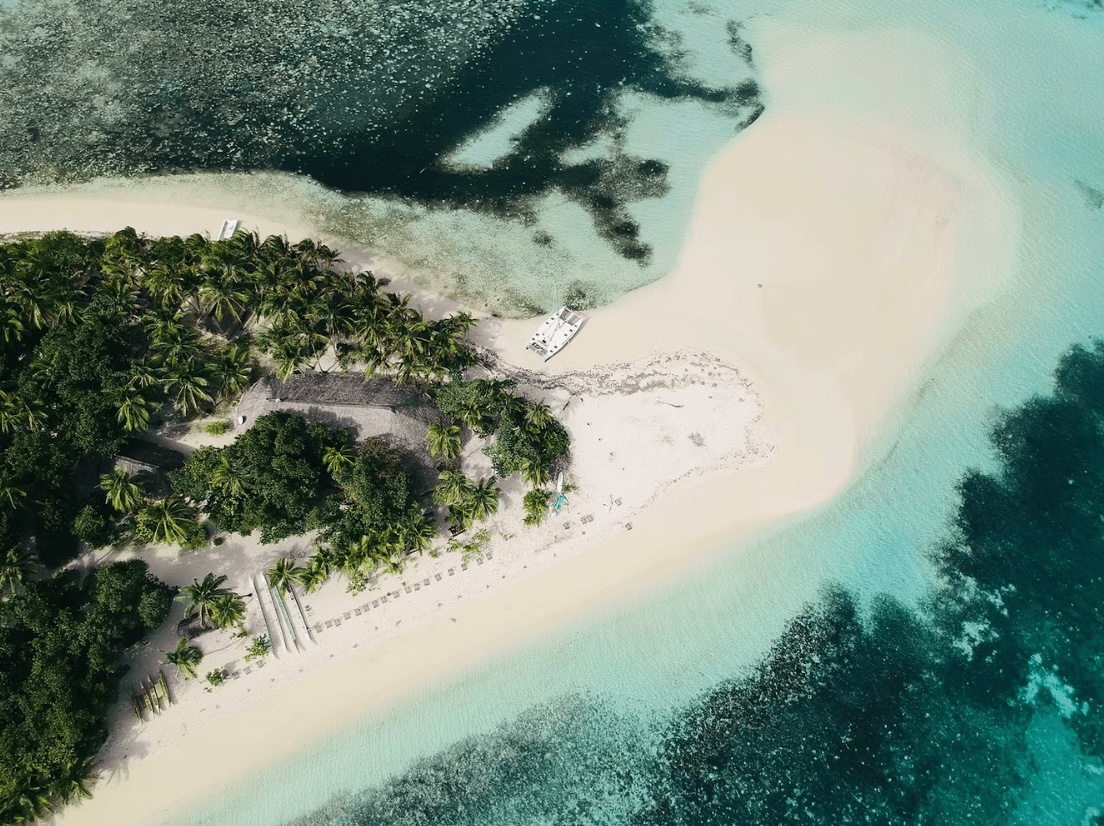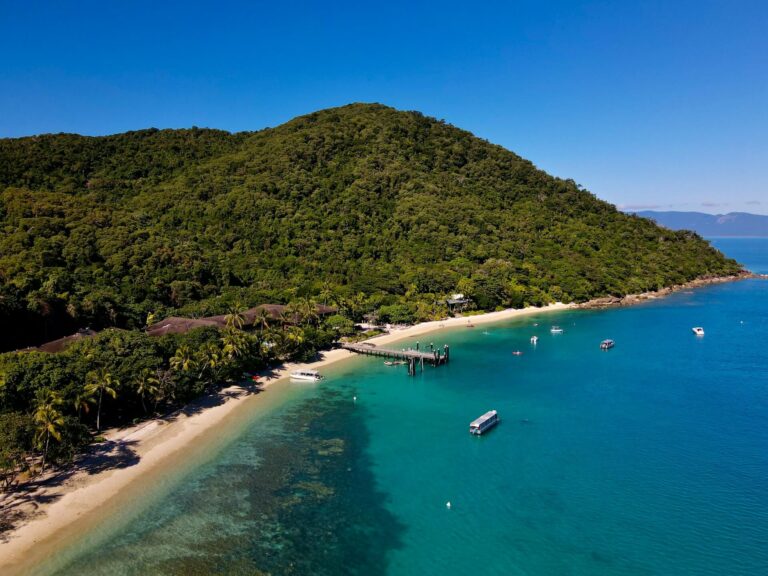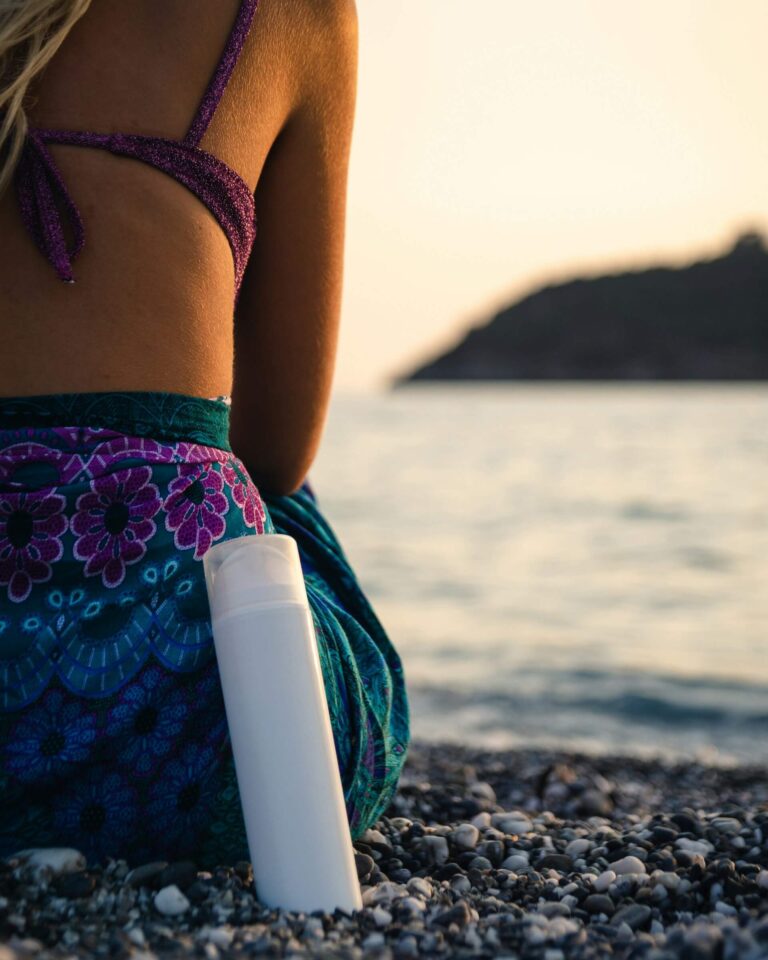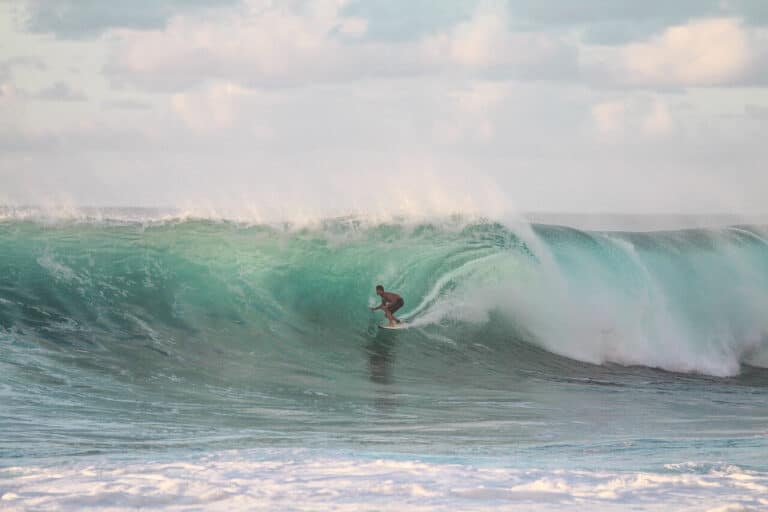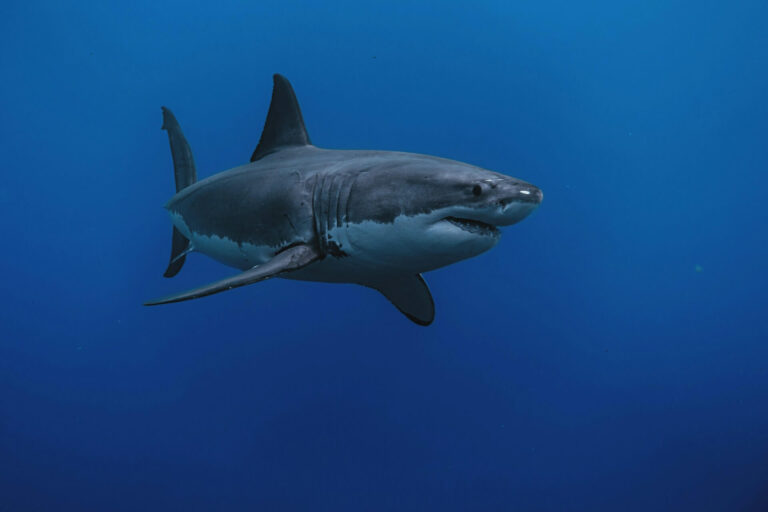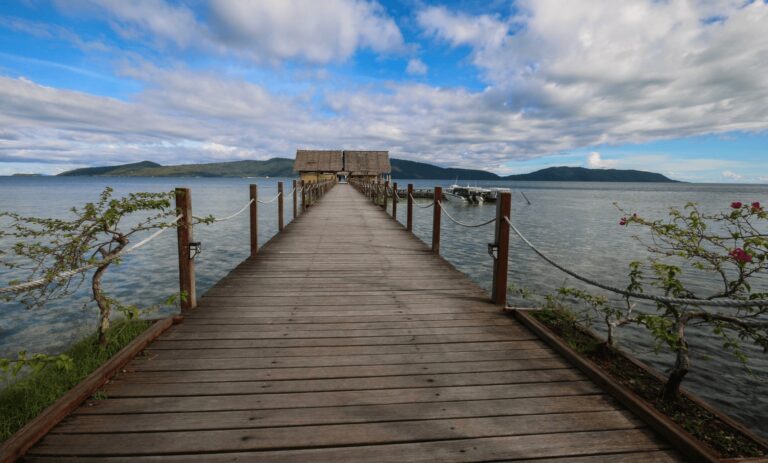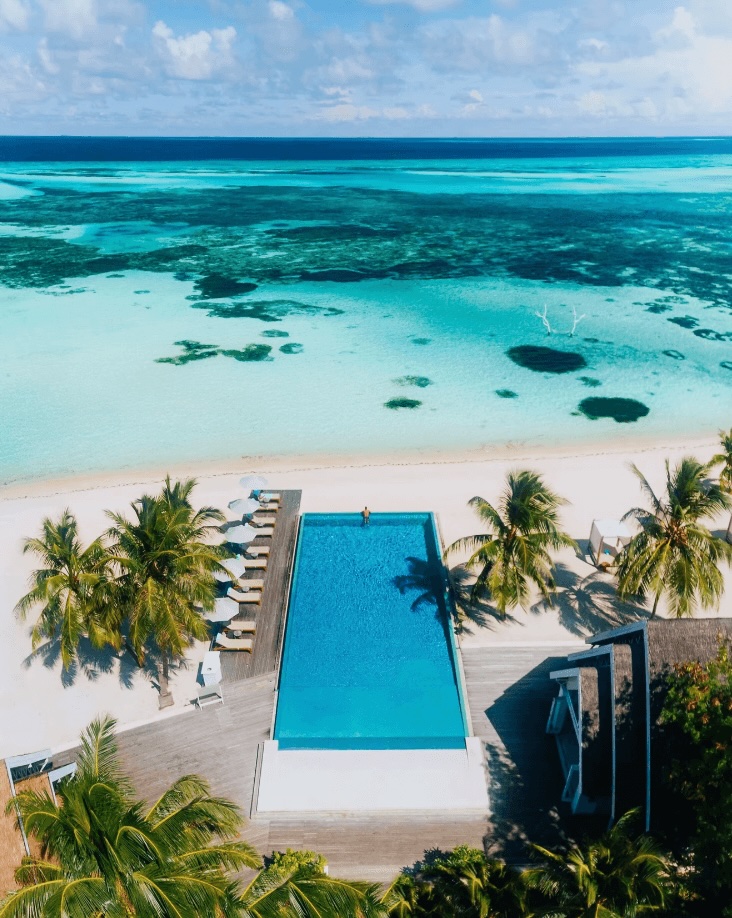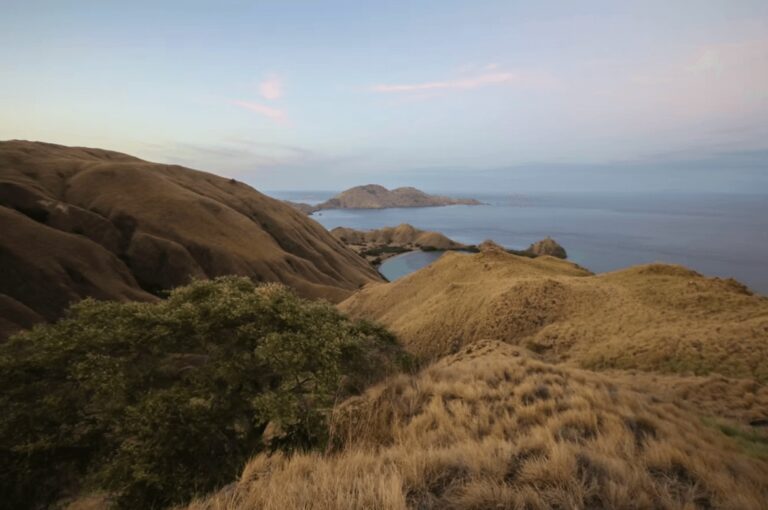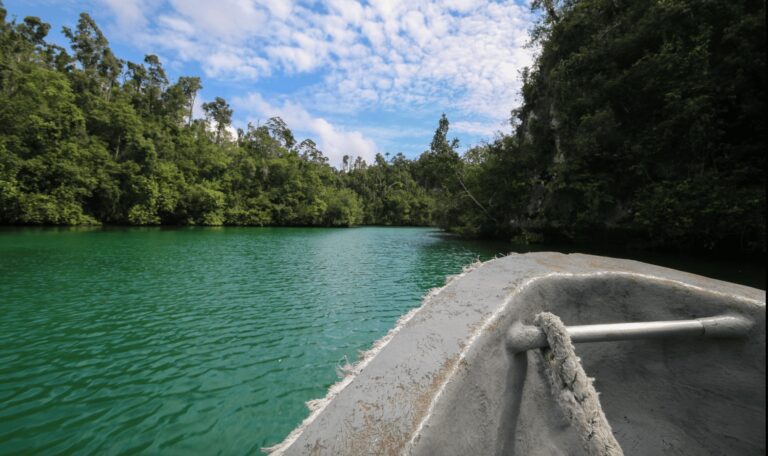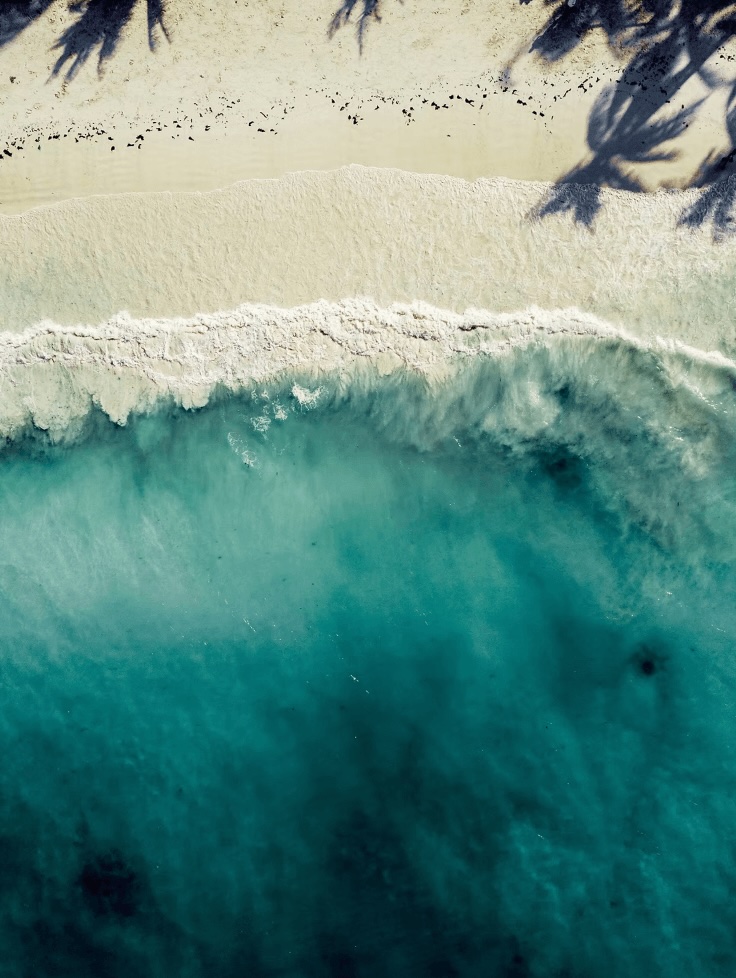Sustainable Scuba Diving in Fiji: Best Dive Sites + Eco-Friendly Dive Resorts
Set amidst the warm, turquoise waters of the South Pacific, Fiji is a scuba diving paradise in Oceania. Based on our experiences there, we think it should be at the top of every diver’s travel bucket list.
This Polynesian nation encompasses over 900 sun-drenched islands and islets, surrounded by some of the region’s most biodiverse coral reefs. In our opinion, Fiji is an idyllic destination for a sustainable scuba vacation.
Fiji is renowned for its world-class shark diving, as well as offering encounters with manta rays, sea turtles and over 1,200 species of tropical fish.
It’s no wonder legendary ocean explorer Jacques Cousteau dubbed it the “Soft Coral Capital of the World” – a designation that has cemented the country’s reputation as one of the best dive destinations in Polynesia.
In this article, discover everything you need to know about sustainable scuba diving in Fiji. We’ll highlight 7 of the best dive sites in Fiji and eco-friendly dive resorts for a sustainable stay.
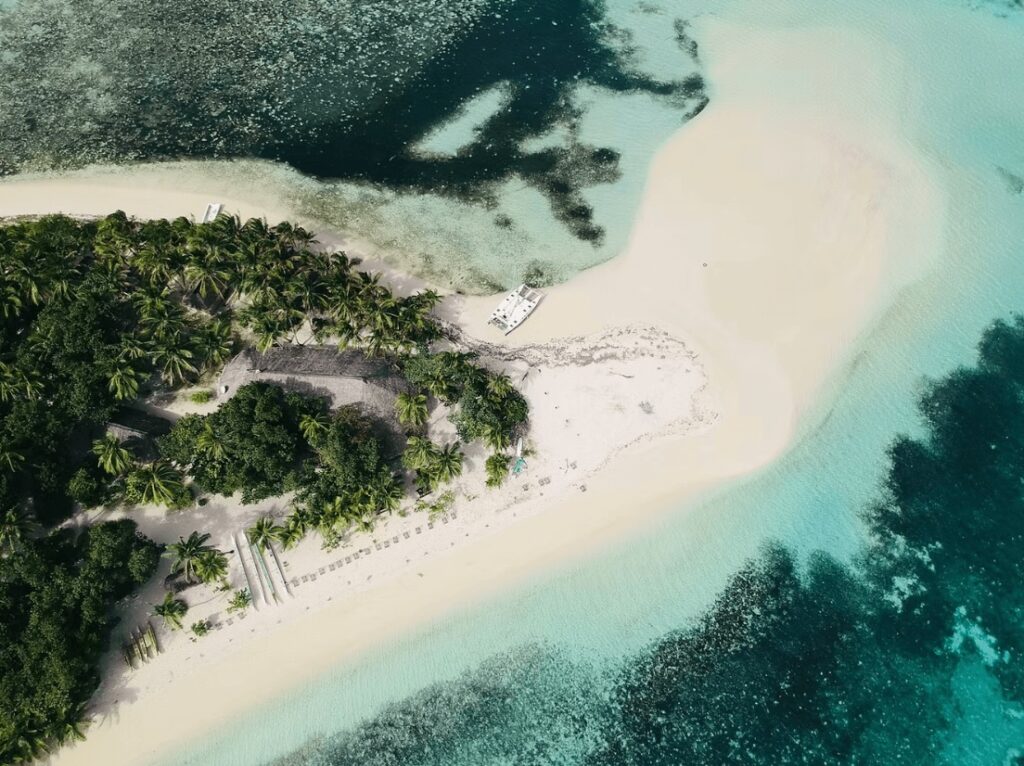
This article contains affiliate links, which means when you make a purchase through that link, I earn a small commission. Affiliate links come at no cost to you and ensure my content remains free!
Rainbow Reef
Located just off the coast of Taveuni Island, Rainbow Reef is one of the best places to dive in Fiji. This underwater wonderland is renowned for its “Great White Wall,” a submerged vertical expanse that extends down to around 40 metres.
This incredible range means that Rainbow Reef caters to divers of all skill levels. From newcomers just learning the ropes to seasoned veterans in search of a challenge.
The wall itself is cloaked in vividly-coloured soft and hard corals that attract countless species of tropical fish. Divers may even spot more elusive creatures like reef sharks, manta rays or the occasional sea turtle gliding effortlessly through the waters.
The dramatic underwater topography of the Rainbow Reef, combined with the sheer abundance of marine life observed here has firmly asserted its reputation as one of the best places to dive in Fiji.
Eco-friendly dive resorts near Taveuni Island
Maqai Beach Eco Resort
Located on idyllic Qamea Island, this inspiring Fiji eco-resort boasts a collection of absolute beachfront bures constructed from locally sourced materials.
In addition to implementing recycling initiatives, an organic garden and coral reef protection programs, the resort is continually upskilling staff in sustainable business practices.
Discover more of the best eco-dive resorts in Fiji in our detailed article here.
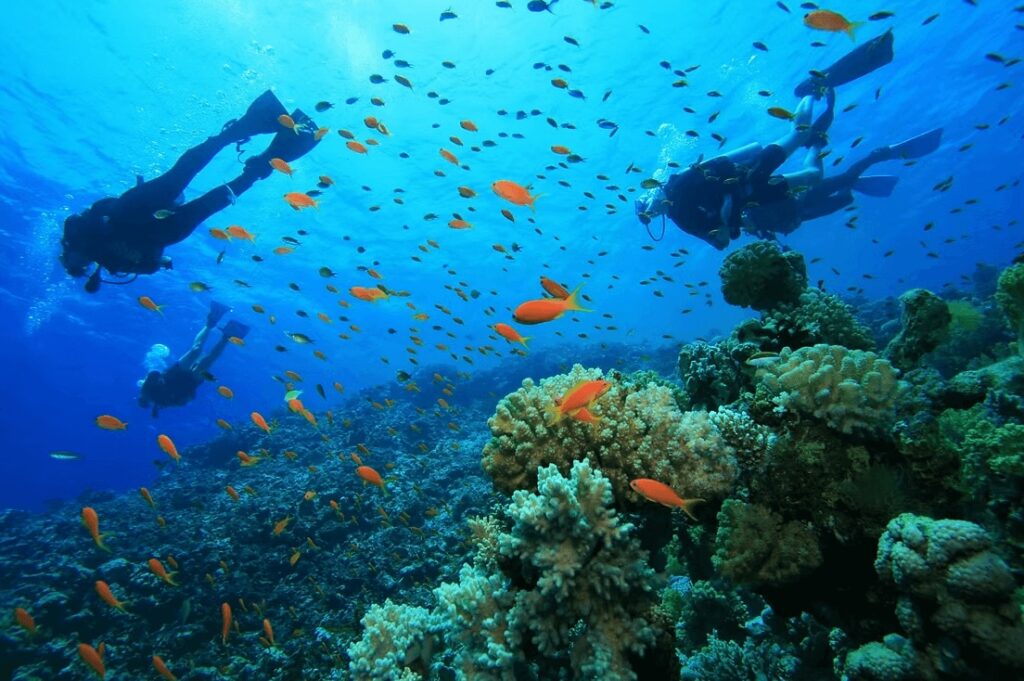
Mamanuca Islands
The Mamanucas are a captivating collection of volcanic islands that scatter just off the west coast of Viti Levu.
Accessible by boat or liveaboard, these sun-drenched pearls are surrounded by an exceptional array of underwater sites that cater to divers of all skill levels.
The geography of the area is quite exceptional, with pinnacles, canyons and craggy reefs that create a mesmerising seascape. Both soft and hard corals carpet the ocean floor, attracting everything from angelfish and butterflyfish to tunas, barracudas and sharks.
A highlight of scuba diving in the Mamanuca Islands is the Namotu Wall, a 1,000-metre drop that’s renowned for its prolific fish life.
Also of note is the Supermarket, a popular feeding site for sharks. Beyond these big predators, its coral wall attracts a diverse array of marine life, including turtles, rays and reef fish.
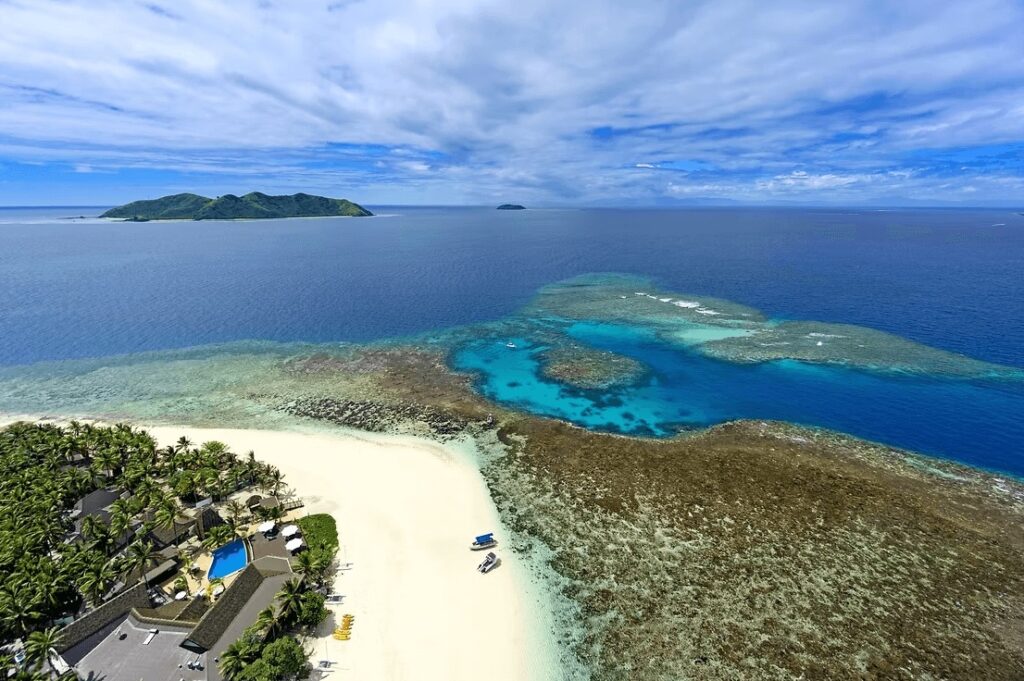
Eco-friendly dive resorts in the Mamanucas
Matamanoa Island Resort
Aside from being one of the most romantic places to stay in the Mamanucas, this adults-only resort is a great base for divers. It is surrounded by coral reefs that are protected within a marine sanctuary that the resort is striving to preserve.
Deep Blue Diving is the in-house scuba operator and offers a range of courses, in addition to daily dives.
Six Senses Fiji
Want to splurge on your eco-friendly dive vacation in Fiji? This luxury dive resort in the Mamanucas is the place to do it, with each of its gorgeous suites and villas opulently appointed.
From energy and water conservation to effective waste management and a reduction in single-use plastics, Six Senses Fiji takes sustainability seriously.
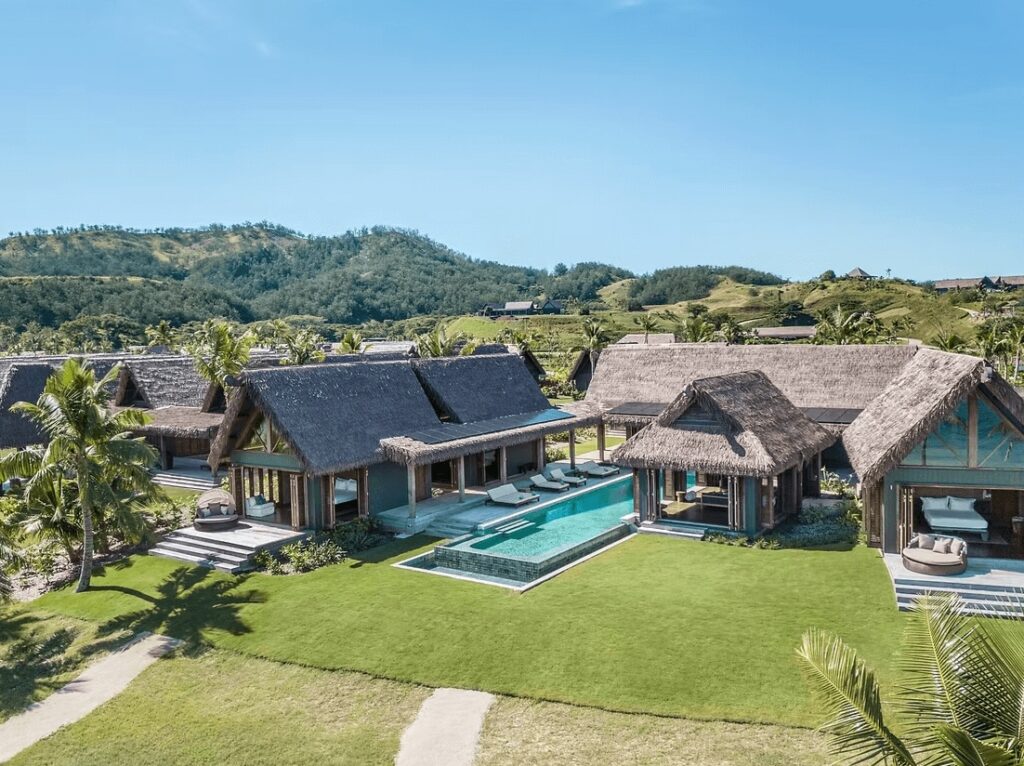
Namena Marine Reserve, Vanua Levu
Located just to the south of Vanua Levu, the Namena Marine Reserve is one of the most biologically diverse dive sites in Fiji.
Accessible from the nearby town of Savusavu, this protected barrier reef system is home to an astounding array of marine life. Over 1,000 species of tropical fish and 400 different varieties of coral have been recorded here.
Colourful bommies rise from the seafloor, their branches and lobes adorned with soft corals. At the same time, towering, hard coral pinnacles punctuate the landscape.
Namena is a treasure trove for marine life enthusiasts. There’s the potential to spot everything from schools of hammerhead sharks during the winter months to playful pods of dolphins and sea turtles in the summertime.
If you’re really lucky, you may even hear the haunting songs of humpback whales. They migrate to and breed in the area between July and October.
Diving in the Namena Marine Reserve is an experience that will leave a lasting impression. For us, it’s definitely one of the best dive destinations in Fiji.
Eco-friendly dive resorts near Namena Marine Reserve
Savasi Island Resort
Set on a private island near the Namena Marine Reserve is this sustainable dive resort. It features just 13 exclusive villas, catering to couples, families and solo travellers alike.
As an eco-friendly Fiji resort, it has eliminated single-use plastics, sources most of its food locally and embraces sustainable, local architecture in its design.
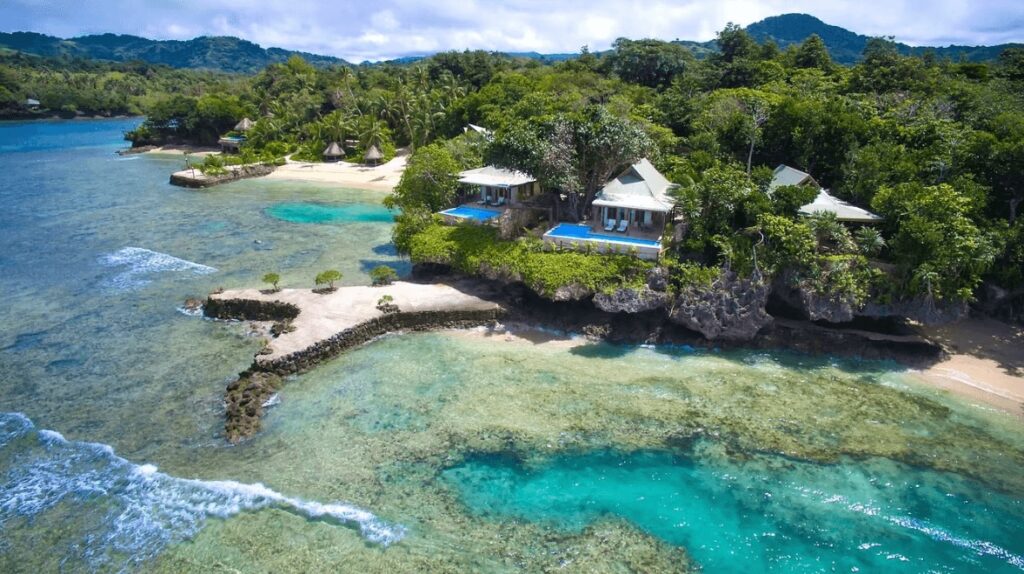
Mantaray Island, Yasawas
Just a short boat ride from Viti Levu lies this hidden gem, which is a prime destination for Fiji diving with manta rays.
Between April and late September, these ocean giants flock to the plankton-rich channels. In doing so, they provide a unique opportunity for both snorkellers and divers to witness their feeding behaviour.
While snorkelling above the manta rays as they glide effortlessly through the water is a magical experience, there is something special about being submerged on a dive and observing their every movement up close.
There’s nothing quite like being mere metres away from these enormous winged creatures. It’s an experience that stays with you long after the dive is over.
The best time to visit Mantaray Island is from May to October – this is the peak season for manta activity in the region.
During this period, mantas congregate in the area for a variety of reasons, including feeding, mating and visiting the numerous cleaning stations in the surrounding waters.
Eco-friendly dive resorts on Mantaray Island
Mantaray Island Resort
With affordable dorms and seaside bures, this sustainable Fiji dive resort caters to a range of budgets. It’s set within the picturesque Yasawa Island group, surrounded by white sandy beaches and thriving coral reefs.
Mantaray Island Resort has previously been a finalist in the Sustainable Tourism category for the Fiji Excellence in Tourism Awards. This has cemented the resort’s commitment to offering eco-conscious stays.
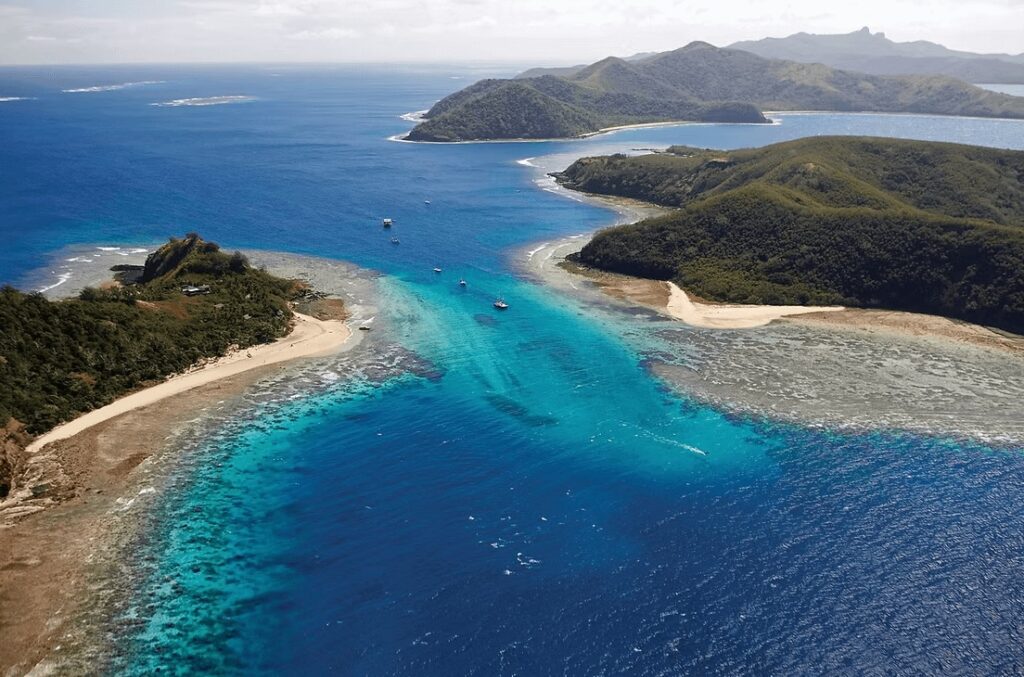
Great Astrolabe Reef, Kadavu Island
Off the coast of Kadavu Island, the Great Astrolabe Reef lives up to its name. Stretching around the entire island, this huge barrier reef system is the third largest in the world.
By some, it is considered one of the most untouched dive destinations on the planet.
Beneath the waters lies a kaleidoscopic diversity of marine life, from schools of iridescent butterfly fish and graceful bat rays to the distinctive profiles of unicorn fish and open-mouthed sweet lips.
Carpeting the seafloor are spectacular coral gardens, a riot of soft and hard corals in every imaginable shape, size and colour.
From May to September, you can witness manta rays gliding effortlessly through the warm currents. They come to feast on the abundant plankton that swirls through the reef’s deeper channels.
Located in the far southwest corner of the Fijian archipelago, the Great Astrolabe Reef can only be accessed by a handful of liveaboard vessels and remote dive resorts. This is helping to ensure its pristine environment remains unspoiled for generations to come.
Eco-friendly places to stay on Kadavu Island
Papageno Resort & Dive
This family-friendly eco dive resort on Kadavu Island makes the perfect base for diving the Great Astrolabe Reef. It features a handful of comfortable chalets set within its lush gardens.
Aside from using solar and micro-hydro energy throughout the resort, Papageno treats all of its own wastewater. It also grows produce for the kitchen in its organic gardens.
Oneta Resort
This family-run Fiji eco-resort is located on Ono Island, just a stone’s throw from the Great Astrolabe Reef. Its Fijian-style bungalows are set amidst beautiful gardens, with the resort only accessible by boat.
In addition to scuba diving, Oneta offers hiking, kayaking and fishing trips, making it ideal for family stays.
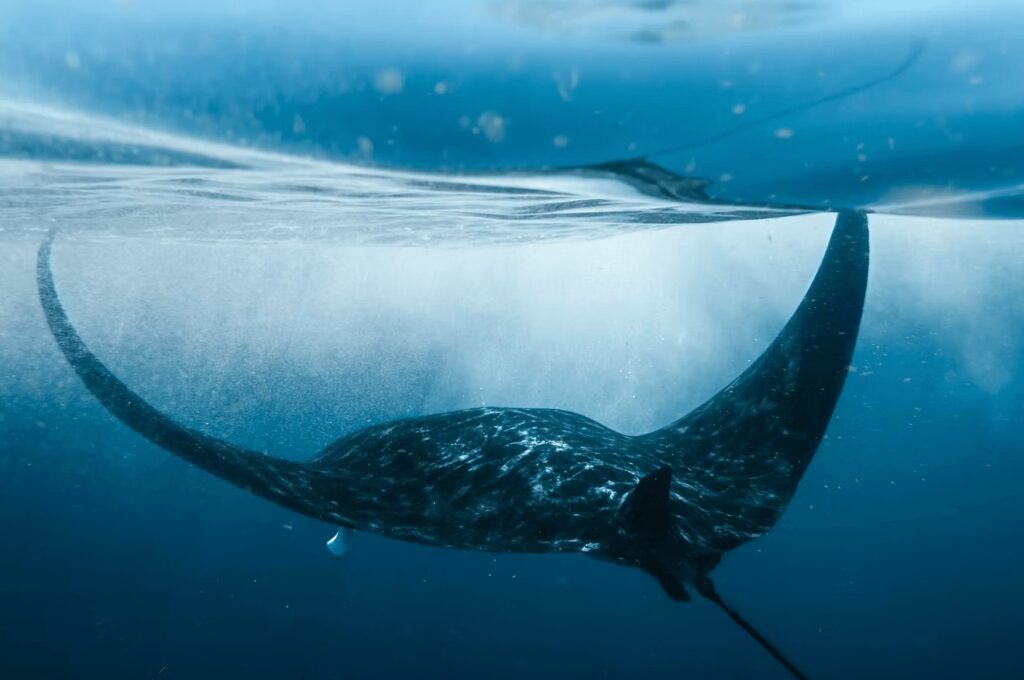
Beqa Lagoon
Located off the southern coast of Fiji’s main island, Viti Levu, the Beqa Lagoon is a mecca for thrill-seeking scuba divers seeking up-close encounters with marine predators.
Nicknamed the “Shark Capital of the Pacific,” this biologically diverse lagoon is home to an astounding array of shark species, from powerful and stocky bull sharks to sleek and graceful tiger sharks.
On any given dive, you can be surrounded by up to seven different shark species, including distinctive black-tipped, white-tipped and grey reef sharks. For the daring, the opportunity to dive alongside these apex predators is unparalleled.
But the Beqa Lagoon is not just about sharks, with breathtaking underwater landscapes that include kaleidoscopic reefs and a mesmerising array of fish.
Formed by the outflow of several rivers, the Beqa Lagoon can experience variable visibility, depending on seasonal rainfall. The drier months of July to September typically offer the best visibility. Meanwhile, the windy period from November through to January can see choppy surface conditions.
Eco-friendly dive resorts near Beqa Lagoon
Beqa Lagoon Resort
Set within tropical gardens overlooking a blissful beach, this eco-resort is the best place to stay to dive the Beqa Lagoon.
Its authentic Fijian bures are constructed from sustainably sourced materials. Plus, there’s a stunning swimming pool where you can relax in between dives.
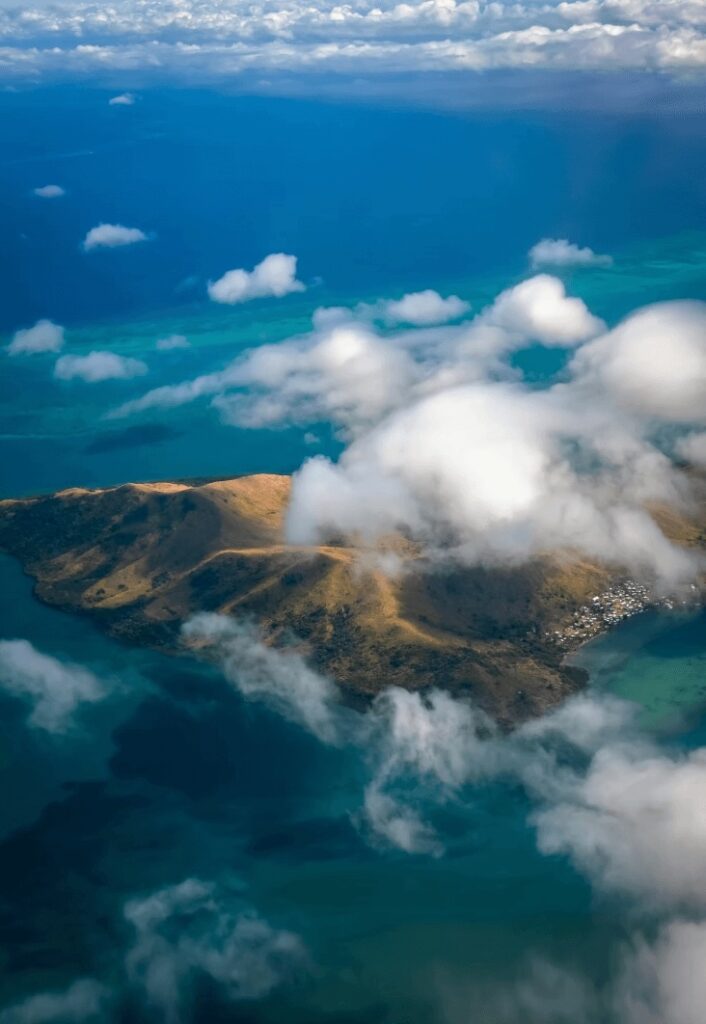
Vatu-I-Ra Passage
Also referred to as the Bligh Water, this stretch of nutrient-dense water separates Fiji’s two largest islands – Viti Levu and Vanua Levu. It’s notable for its astounding marine biodiversity and soft coral reefs, making it one of the best places to dive in Fiji.
When diving the Vatu-I-Ra Passage, you can expect an incredible visual spectacle, with schools of colourful damselfish darting amongst the anemones swaying in the current. If you keep your eyes peeled, you may spot the silhouette of a reef shark gliding by or a curious sea turtle as it surfaces for a gulp of air.
The abundance of marine life here is a testament to the ecological richness of the Fijian waters.
Eco-friendly dive resorts near the Vatu-I-Ra Passage
Volivoli Beach Resort
Perched on the northern tip of Viti Levu, this eco-friendly Fiji dive resort offers access to more than 90 incredible scuba sites.
On its mission to become carbon neutral, Volivoli has planted several hectares of mangroves nearby in partnership with Mangroves for Fiji.
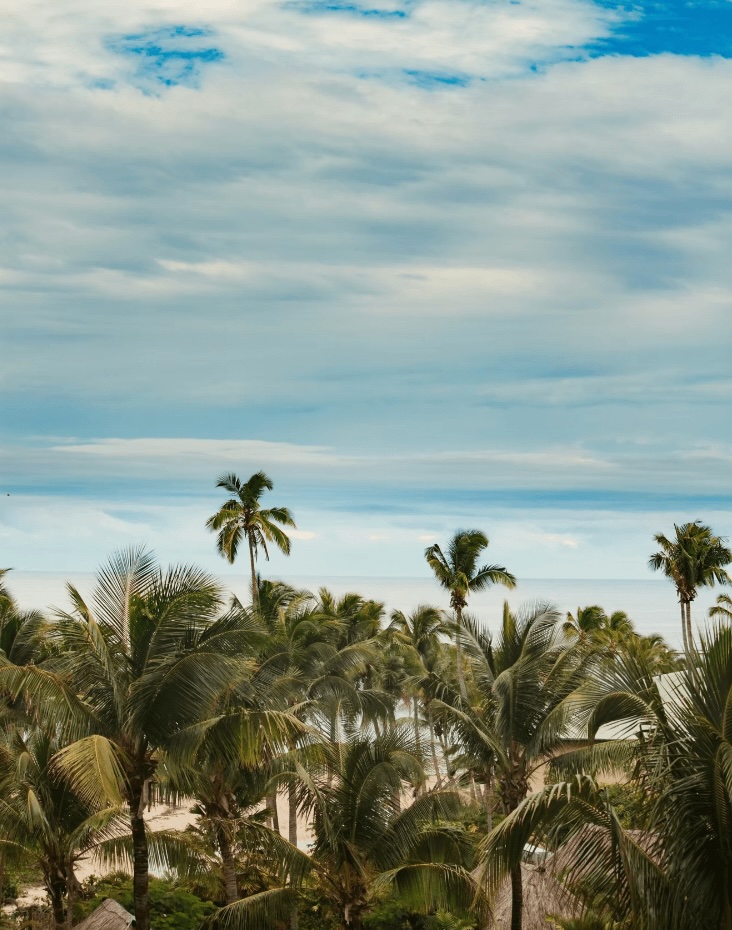
Best time to dive in Fiji
Fiji’s tropical climate is nothing short of idyllic, with average temperatures ranging between 28 to 30°C (82 to 86°F) year-round. The surrounding waters typically hover between 23 and 27°C (73 and 81°F). Most divers are comfortable in a 3mm wetsuit.
While it’s possible to dive throughout the year, the main scuba season in Fiji is from April to October. However, the best visibility tends to be from July to December when the water temperatures are slightly cooler.
The cyclone season, which runs from November through March, brings with it increased swells, rainfall and ocean currents. These can impact visibility and create more challenging conditions underwater.
Fiji is also an incredible destination for a surf trip, with a handful of eco-friendly surf resorts that can get you to all the best waves.
FAQs about diving in Fiji
Does Fiji have good scuba diving?
Fiji’s reputation as a world-class dive destination is well-deserved. This island nation boasts a breathtaking array of marine life and diverse underwater landscapes.
It has been dubbed the “Soft Coral Capital of the World” and is widely regarded as one of the best places to come face-to-face with sharks in the wild.
The strong ocean currents that sweep along Fiji’s outer reefs bring nutrient-rich waters. This creates a thriving ecosystem that attracts an astonishingly diverse array of marine creatures.
Divers can encounter everything from nudibranchs and pygmy seahorses to pelagic predators like schools of hammerhead sharks, manta rays and whale sharks. With more than 390 species of coral and around 1,200 fish species, Fiji is an underwater naturalist’s dream.
Scuba diving in Fiji means exploring everything from walls to swim-throughs and caverns teeming with life.
What months are best for diving in Fiji?
Fiji’s tropical climate is nothing short of idyllic, with average temperatures ranging between 28 and 30°C (82 and 86°F) year-round.
The best months for scuba diving are typically from April through October. This is when Fiji enjoys relatively calm ocean conditions and comfortable water temperatures that make for optimal underwater exploration.
The best visibility tends to occur from the mid-summer months of July through December.
The region’s cyclone season runs from November through March. During those windier, wetter months, the increased swells, rainfall, and ocean currents can significantly impact visibility and create more challenging conditions for divers.
Do I need a wetsuit for diving in Fiji?
The waters of Fiji typically hover between 23 and 27°C (73 and 81°F). Most divers are comfortable in a 3mm wetsuit.
During the warmer summer months, you may want to forego a wetsuit altogether and opt for a lightweight rash guard, a pair of boardshorts or a bathing suit.
That being said, if you’re diving in an area with cold upwellings, it is a good idea to have some thermal protection.
Wetsuits can be hired from most dive resorts and centres if you don’t want to bring your own.
How much experience do you need to dive in Fiji?
The amount of experience you need to dive in Fiji depends on where you want to dive and how deep you want to go. Many dive resorts in Fiji offer Open Water certification courses, with training done on shallow coral reefs and sandy bottoms.
If you want to explore deeper dive sites, caves or wrecks, it’s best to have an Advanced Open Water certification.
If you’re not sure, check with the dive resort about the experience level they require before taking you out to certain dive sites.
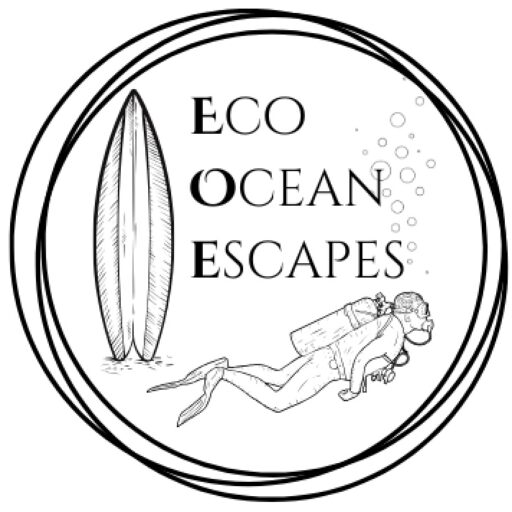
PLAN YOUR TRIP WITH OUR FAVOURITE RESOURCES:
Find hotels and resorts via Booking or Agoda
Book tours and experiences via Viator or GetYourGuide
Find a rental car via Discover Cars
Book flights via Kiwi or Booking
Search for buses and trains via 12Go or Omio
Get travel insurance via SafetyWing
Buy a digital eSIM with Airalo
By purchasing through our links, you’ll be supporting our website at no additional cost to you
About the authors
We are a team of passionate divers and surfers with decades of combined experience in the water and travelling to all corners of the globe. After years of chasing waves and descending into the deep blue, we’ve created this resource to highlight sustainably run surf camps, eco-friendly dive resorts and conservation-focused ocean trips to help inspire your next adventure.
Eco Ocean Escapes was born out of a love of the ocean, an obsession with travel and a concern about the impacts of our adventures on the environments we explore. Despite the benefits that surf and dive tourism can bring to local communities, we recognised that ocean-based adventures are not always managed in a sustainable manner.
Through our articles, we hope to inspire those seeking a responsible surf or dive trip that is all about supporting local communities, preserving our coastal environments and the incredible marine species that inhabit our oceans.
-
Are Wave Pools Sustainable? The Surf Park Environmental Debate
Nothing compares to surfing in the ocean. Full stop. For us, being at the whim of Mother Nature is a big part of surfing’s allure, and all things being equal, we’d pick the ocean over a wave pool every time. But with coastal communities under increasing pressure and surf breaks being flooded with people, are…
-
10 Easy Ways Surfers and Divers Can Protect the Ocean While Travelling
For surfers and divers, the ocean isn’t just a destination. Often, it’s the reason we travel, full stop. But the very act of travelling across the globe to chase waves or incredible underwater experiences comes with an environmental cost. There’s the carbon footprint of air travel, the overdevelopment of coastlines for waterfront resorts and the…
-
5 Sustainable Dive Destinations to Add to Your Scuba Bucket List
Scuba diving connects us deeply with the ocean. And in our experience, the more you do it, the harder it becomes to remain naive about the threats our underwater ecosystems face. Climate change, agricultural runoff and plastic pollution are just the tip of the iceberg! But sometimes that threat is tourism itself – unregulated tourism…
-
Reef-Safe Sunscreen: Does It Really Make a Difference?
If you’ve been on a dive liveaboard recently or stayed at a sustainable surf resort, you may have been advised to bring only “reef-safe sunscreen”. This request is often included in trip dossiers and/or mentioned by dive/surf guides before heading into the water. These days, there’s a consensus amongst the ocean-loving community that reef-safe sunscreen…
-
The Biggest Threats Facing Surf Breaks Worldwide
We’re as guilty as the next surfer for taking our breaks for granted. They’re our playgrounds – firing up one day and flat the next, but always with another swell on the horizon. But the reality is, surf breaks are delicate coastal systems shaped by geology, tides, sand movement and the overall health of marine…
-
Shark Conservation: How to Dive Responsibly With Sharks
Sharks have roamed our oceans for more than 400 million years (yes, they’re older than dinosaurs). Today, there are more than 400 different species, ranging from tiny dwarf lantern sharks to predatory great whites and tiger sharks. Unfortunately, many face an uncertain future. This is due to habitat loss, bycatch and demand for shark fins,…
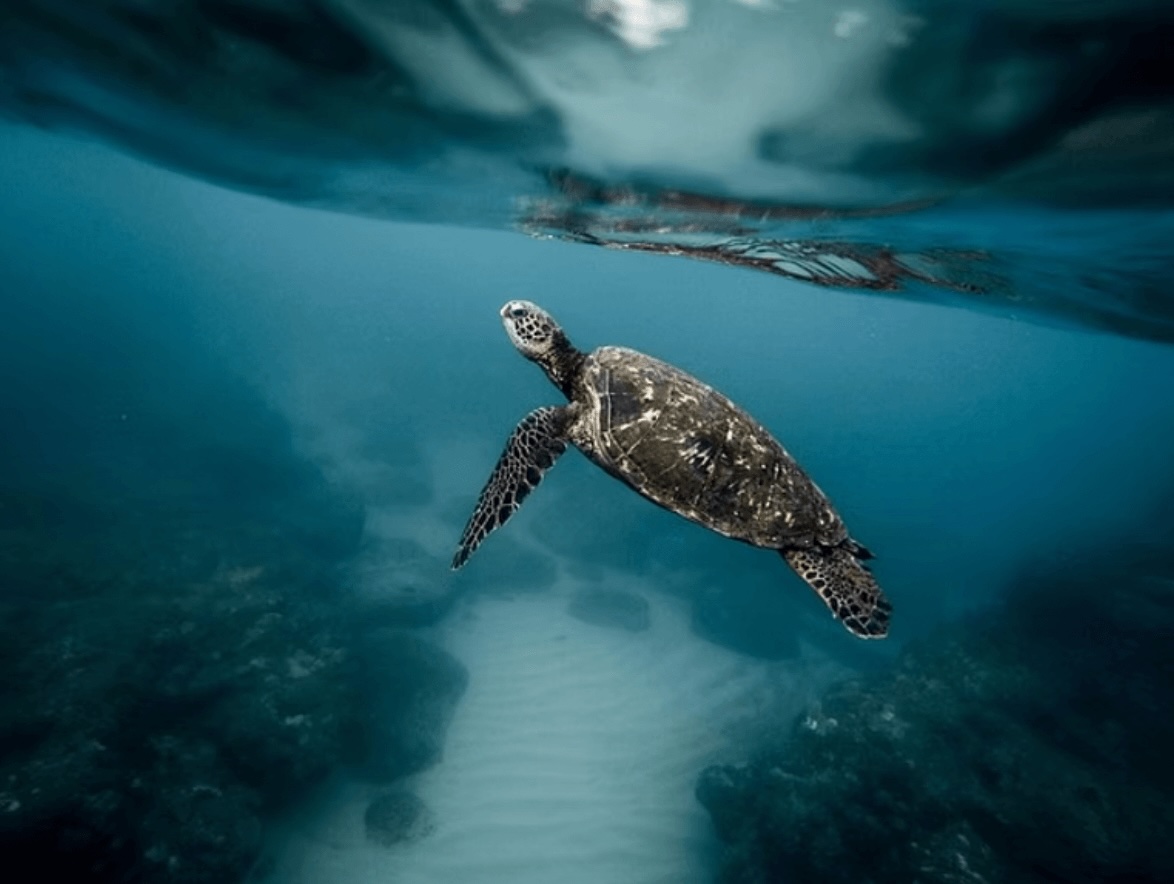
We are a team of passionate divers and surfers with decades of combined experience in the water and travelling to all corners of the globe.
After years of chasing waves and descending into the deep blue, we’ve created this resource to highlight sustainable surf camps, eco-dive resorts and conservation-focused ocean trips to help inspire your next adventure.
Eco Ocean Escapes was born out of a love of the ocean, an obsession with travel and a concern about the impacts of our adventures on the environments we explore.
